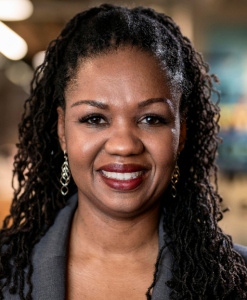Racial disparities continue to plague Black Americans in part because of the persistent perception that they are, by nature, threats to law and order, said Jamila Hodge, CEO of Equal Justice USA.
“We have won many legal battles — the abolition of slavery, Civil Rights and ending Jim Crow — but we have never won the narrative battle, the narrative that justified slavery, that Black people were not human, that Black people needed to be controlled, that Black people were violent. Those narratives persist because we have never won that battle,” Hodge said during a recent keynote address to the Christian Community Development Association annual meeting in Cincinnati.

Jamila Hodge
Hodge, whose presentation was preceded by a panel discussion about eliminating the death penalty, also explained how anti-Black narratives laid the groundwork for an unjust criminal punishment system deliberately constructed and maintained to control African American and other marginalized racial groups.
“I’ll just run through a few statistics. One out of three Black men can expect to be incarcerated (in their lifetimes). One out of six of our Latino brothers can expect to be incarcerated, and we can compare that to one out of 17 of our white brothers,” she said.
Pre-trial detention rates are three times higher for Black people who are also much more likely to endure traffic stops by police and more likely to be searched during those encounters. “And we all know from the death-penalty arena that more than 40% of Death Row is Black.”
According to the Death Penalty Information Center, whites, at 42%, comprise the largest single racial group on Death Row. All other ethnic groups, including Blacks, combined account for 58% of condemned prisoners in the U.S. But as a percentage of their ethnic population, Blacks and other non-whites are disproportionately represented on Death Row.
It all began with the ratification of the 13th Amendment banning slavery in 1865, Hodge said. Many states responded with laws enabling states and municipalities to easily convict Blacks for vagrancy and other minor offenses, and in turn lease them to private companies and farms as forced laborers.
The modern U.S. criminal legal and prison system emanated from an era seeking to continue the subjugation of Black people, she explained. “When we understand that history, those statistics and numbers I just went through have a very different meaning.”
A modern-day example is the Louisiana State Penitentiary, also known as Angola, she said. “It is a prison set on a plantation, and men still do similar work out in the fields for pennies. They have their names taken away, they are given a number, and they are exposed to significant violence.”
The same system is at work in nationwide efforts to prohibit teaching about slavery in public schools, which is part of a deeper attempt to rewrite history and to mask the true nature of the criminal legal system, Hodge charged. Meanwhile, Black and marginalized people continue to be funneled into the nation’s $300 billion maze of courtrooms, jails and prisons at the expense of health care and social services.
“We have 4% of the world’s population, but 20% of the world’s incarcerated population.”
“I want to be clear that we are a country that incarcerates more than any other industrialized nation in the world,” she said. “We are No. 1. We have 4% of the world’s population, but 20% of the world’s incarcerated population. If incarceration is supposed to make us safe, we should be the safest place on earth, and that is just not the case.”
And it is the poor who stand little chance of finding true justice in that unjust system and even less so in death penalty cases, Ohio death row exoneree Derrick Jamison said during the death penalty panel at the convention.
“A lot of my friends died. They didn’t die because they were guilty. They died because they were poor,” he said. “How are you going to defend yourself if you’re going up against (prosecutors) who have millions of dollars, and you’re from the neighborhood? When you’re poor, your family can’t help you. Nobody can help you but God.”
The panel hosted by EJUSA also included Demetrius Minor, national manager of Conservatives Concerned About the Death Penalty, and Allison Cohen, executive director of Ohioans to Stop Executions.
Minor acknowledged supporters of capital punishment can find Scripture passages that seem to endorse the practice. But he urged them to focus on the teachings and compassion of Jesus instead of what federal and state laws allow.
“So many times, people forget that Jesus is not an American and that when we stand before him on that glorious day, he’s going to judge us according to the word of God and not according to the Constitution. Look at things in every area of life through the lens of the word of God.”
“He’s going to judge us according to the word of God and not according to the Constitution.”
People of faith who condone capital punishment should also consider the flaws in the system itself, Minor said. “Do you trust the state of Ohio to get it right? It’s one thing if Jesus himself administers punishment. But now you’re talking about leaving the scope of justice in the hands of fallen men who are imperfect, who have impure motives. If we get it wrong once, that’s once too many.”
Debates about the effectiveness, expense and equity of capital punishment have been surging in Ohio during the ongoing death penalty moratorium enacted by Gov. Mike DeWine in response to lack of lethal injection drugs, Cohen said. “It’s given us an opportunity to talk to lawmakers about how the death penalty really works, about how it’s unfairly applied, about how it’s racially biased, about how it threatens innocent life, about how it harms the families of murder victims.”
One result of that dialogue is several bills to ban executions in Ohio that are moving through legislative committees.
Currently, 27 states still have the death penalty but only Alabama, Florida, Missouri, Oklahoma and Texas have executed prisoners in 2023, figures from the Death Penalty Information show. Seven states, including Virginia in 2021, have banned capital punishment since 2009, while California, Oregon and Pennsylvania have joined Ohio with gubernatorial holds on executions.
Cohen said Ohioans are ready for an outright ban on capital punishment: “I have seen a huge shift in the way Catholics and other Christians, and people of all faiths, talk about the death penalty as they have learned about the way it really works.”
One of the ways the death penalty really works is through the conviction of innocent people, said Jamison, whose 1985 capital punishment was overturned 20 years later due to perjured testimony and police misconduct.
Spending two decades on Ohio’s Death Row was terrifying, he said. “I was in hell watching my friends die. Jesus Christ was executed at the age of 33. Why are we still killing people? You know, they’re making too many mistakes with the death penalty.”
Related articles:
How I came to oppose the death penalty | Opinion by Stephen Reeves
Opposition to death penalty gaining steam through broad coalition


